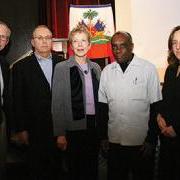|
The news reports of violence and chaos in Haiti in the aftermath of January’s devastating earthquake don’t tell the real story of what’s going on in Haiti. To understand the earthquake’s true impact is to acquire an awareness of Haiti’s history, its vibrant culture and the resiliency of its proud people. Five UAlbany professors, all of them UUPers, staged a Feb. 3 teach-in at the college to provide some perspective on the catastrophe, focusing on Haiti’s history, its art and spirituality, and listening to firsthand accounts of how Haitians are coping. Nearly 300 students packed UAlbany’s Performance Arts Center Recital Hall to hear the lectures. “We’re getting a very partial, confusing view of what’s going on in Haiti through news coverage,” said Eloise Briere, an associate professor in UAlbany’s department of languages, literatures and culture, and the event’s organizer. “If you know the Haitian people, those reports seem to be an unfair assessment.” Briere, her husband Jean-Francois Briere, and three other UUPers—Charles Scholes, Glyne Griffith and Phyllis Galembo—took part in the event, which included comments from Fr. Joseph Philippe, a Haitian priest who was in Haiti when the earthquake hit. Jean-Francois Briere is a professor and chair of the department of languages, literatures and culture. Scholes is a professor of chemistry; Griffith is an associate professor of English and chair of Latin American, Caribbean and U.S Latino Studies; Galembo is an art professor. Galembo, also a photographer, has traveled to Haiti for almost two decades. She was awarded joint labor/management grants to help finance some of those trips, which resulted in her 1998 book, Vodou, Visions and Voice of Haiti. “We want to let people who don’t know that much about Haiti to develop an appreciation for its arts and culture,” she said. “I have many friends in Haiti and Haiti has been a friend to me. I want to help.” Scholes talked about the earthquake’s impact on a school for the developmentally handicapped in Haiti where he volunteers. Jean-Francois Briere provided a historical overview of Haiti and France after 1804; his book, Haiti et la France: 1804-1848, was published in France in 2008. Griffith took issue with a Jan. 15 New York Times op-ed column about Haiti in his discussion, titled “The Underlying Tragedy: Imperialist Views from the U.S. “I think the Haitian people are amazingly resilient and strong,” said Eloise Briere. “They threw off the most powerful army in the world, the French Army in 1804, and they did that when they were slaves, without the benefit of education and what it brings.” More than 200,000 people were killed in the Jan. 12 earthquake, a catastrophic 7.0 magnitude event that hit 16 miles west of Port-au-Prince. — Michael Lisi |
Warning: count(): Parameter must be an array or an object that implements Countable in /home/uuphos5/public_html/voicearchive/wp-includes/class-wp-comment-query.php on line 405


